Bonobo Handshake
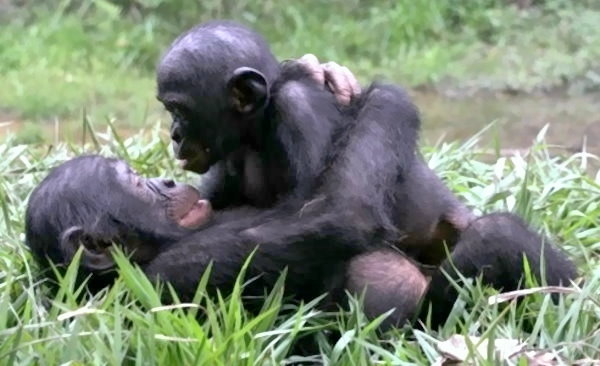
Bonobos enjoy sex in the “missionary position,” often gazing deeply into each other’s eyes like Tantric sex practitioners or two people very much in love. Photo: Vanessa Woods
The “Make Love Not War” bonobos have a new friend. She’s an ape like them—a brilliant, beautiful, empathetic, courageous creature on the human branch of the primate family tree. Her name is Vanessa Woods, and she has written a wonderful, ground-breaking new book called Bonobo Handshake, a must-read for anyone interested in primatology, anthropology, sex, love, war, peace or that greatest of mysteries we commonly call human nature.
Now, if you don’t know a bonobo from a banana, let me introduce you to our kissin’ cousins who swing from the trees (as well as with each other). Bonobos are a rare species of chimpanzee sometimes called “pigmy chimps,” (Latin: pan paniscus) and, like common chimps (pan troglodyte), they’re over 98% genetically similar to humans. Though they tend to be a lot hairier than us—and they don’t build houses or churches or corporate skyscrapers or Pentagons, like we do—they do look and act remarkably like us in many, often surprising ways. Take sex, for instance. The genitals of bonobo females are rotated forward, like in human females, allowing face-to-face sex, rather than just “doggie style” like most animals. Basically, bonobos can have sex in as many positions as humans can (even more actually) and they do have sex—a lot.
Peace through Pleasure
I’m not just talking about sexual intercourse, but also much of what we call foreplay: the give and take of sensuous pleasures of all different sorts, including fellatio, cunnilingus, sex with food, masturbation, gay sex, group sex, massage, sex in different positions and lots of long, deep, soulful, French kissing.
But it’s not just how bonobos have sex that fascinates—it’s how they use sex: as part of a barter system (e.g., I’ll give you an apple if you give me a handjob); to ease stress (e.g., Don’t be nervous, come here and sit on my face); and to reduce violent conflict. And here’s the kicker: unlike common chimps (and humans), bonobos have never been seen deliberately killing each other, neither in the wild nor in captivity. Apparently, all that hot sex just cools ‘em out. The males are especially peaceful. Unlike common chimps and other great apes, bonobo society is not male dominated. Female bonobos have the strong relationships, creating a chimp version of “sisterhood” that gives the ladies a lot of power.
Embarrassing Relatives
Speaking of powerful females, with the publication of Bonobo Handshake, Vanessa Woods has emerged as one of the world’s foremost advocates for the highly endangered bonobos; certainly among the fiercest that I’ve encountered since I first fell in love with these adorable apes, having caught them frolicking, fornicating and peace-making on a PBS documentary called “The Nature of Sex” in 1994.
Bonobo Handshake author Vanessa Woods gets her hair styled by a bonobo.
When I saw how much they look like us and how remarkably sexual and peaceful they are, I assumed that everyone would fall in love with bonobos, just as I had. I was sure that bonobos would become *the next big thing* in the human media. Boy, was I wrong about that!
For years, the vast majority of the media has treated bonobos as some embarrassing relative in our primate family that had to be shut away in a dark basement. Not many primatologists studied them and the few that did were often reluctant to speak freely and openly about their remarkable sexuality for fear of losing their grants or even their jobs. My own work to promote awareness of the bonobos, their amazing sexuality and their urgent plight was criticized in certain primatology circles for focusing “too much” on their sexual behavior and for “using” them as an inspiration for what I call The Bonobo Way, a philosophy of keeping the peace by sharing various pleasures, including sexual pleasures.
Bonobo Bashing in the New Yorker
Bonobos got a bad rap in a 2007 New Yorker article by Ian Parker who mentioned The Bonobo Way, but spent thousands of words promoting the unfinished research and ruminations of primatologist Gottfried Hohmann, with the very pointed implication that bonobos aren’t really as sexual or as peaceful as deluded hippies like me (and another great friend of the bonobos, Sally Coxe, director of the Bonobo Conservation Initiative) would have you believe.
Recent field research has effectively proven that Mr. Parker’s “bonobo-bashing” thesis was wrong; we hippies were right after all. Bonobos are extremely sexual (especially if you define sex as more than just intercourse), and, though they fight tooth-and-nail every so often, they still haven’t been seen killing each other—in any context—let alone making war like common chimps and humans do. Nevertheless, the New Yorker still hasn’t published anything to reflect these findings, let alone printed a retraction.
Studiously Ignoring Our Kissin’ Cousins
Even more ironically, when Dr. Owen Lovejoy and his team of anthropologists discovered Ardi (Ardipithecus ramidus), the 4.4 million year old fossil of a human ancestor, bonobos barely got any rap at all. Despite the rather bonobo-esque sound of Lovejoy’s own name, he doesn’t even acknowledge that Ardi—with her stooped but two-legged walk, tree-dwelling lifestyle and peaceful ways—is very much like a bonobo, though he does take great pains to say that she is not much like the violent, war-making, ground-dwelling, four-legged common chimp. It’s as if Dr. Lovejoy was so concerned about downplaying Ardi’s closeness to common chimps that he “forgot” all about our equally close relative, the bonobo.
Even more recently, Dr. John Mitani’s research into why common chimps kill each other in a war-like fashion (apparently, to expand their territory) was trumpeted by most of the major media as giving the definitive evolutionary psychology behind why human beings make war. Despite thousands of pages of coverage of the warring chimps, barely a word was written about humanity’s other cousin who is at least as genetically close to us as common chimps and never makes war at all.
It’s as if the media is trying to tell us (or sell us on the idea) that we humans are irreparably murderous, war-making creatures—after all, our close cousins, the common chimps, are—so let’s relish our murders and wars, including our obscene media coverage of them, and forget about trying to end them.
But what about our other close cousins—the ones our media has shut away in that primate family basement: the peaceable, sexual bonobos? Aside from Dr. Frans de Waal’s excellent “Bonobo: The Forgotten Ape” (with beautiful photos by Franz Lanting), there had been no books published by a major publishing house with bonobos as the sole focus. That changed a couple months ago, when Penguin’s Gotham Books published Bonobo Handshake, Vanessa Woods’ extraordinary “memoir of love and adventure in the Congo.”
Bonobo Handshake Breaks the Silence
It’s a terrific introduction to bonobos for the novice, and a real treat for people who, like me, already love bonobos and are hungry to know more. Even if you’re not the least bit interested in bonobos (in which case, you should be ashamed of yourself!), you’ll lose yourself in this fantastic love story set against the wild, war-torn backdrop of the Democratic Republic of Congo.
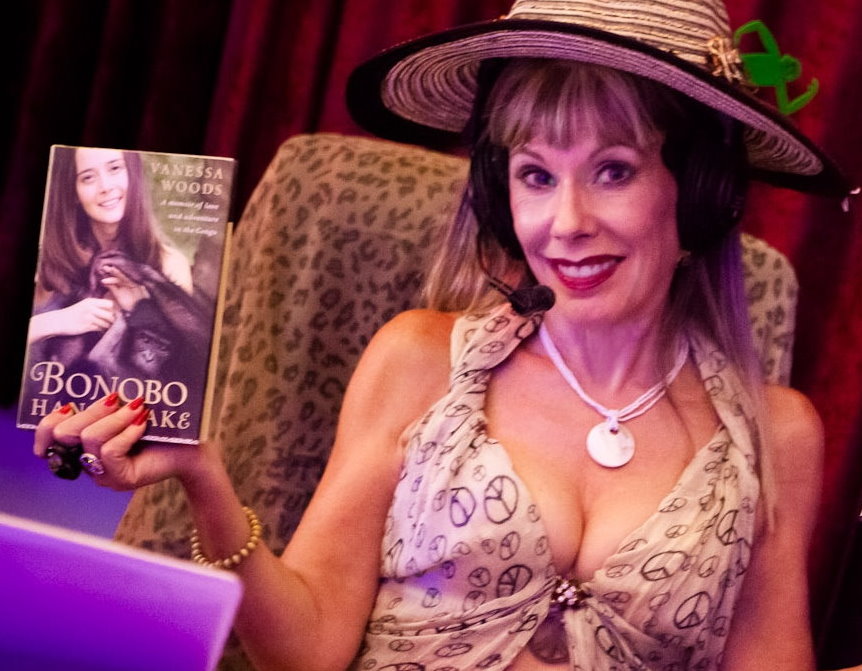
Getting ready for a RadioSUZY1 “Bonobo Handshake” with Vanessa Woods. Photo: JuxLii
Vanessa Woods, whom I interviewed on radioSUZY1 last Saturday, had a very personal reason for agreeing to accompany her newly wedded husband, Dr. Brian Hare (now an assistant professor of Evolutionary Anthropology at Duke University), into the “Heart of Darkness” that is the Congo. Her dad had fought in Vietnam and returned home, to Australia and to his family, his own variant of PTSD wreaking mild havoc on everyone—his daughter included. Vanessa entered the Congo—even as vicious wars raged between Tutsis and Hutus, Nationals and Rebels and their various supporters and enemies—because she wanted to try to somehow grasp the effects of war on its participants. She wanted to understand her dad.
Woods did learn a lot about war in the Congo. Her book is one of the few I’ve read that makes any sense of the incredibly convoluted, complicated history of Congolese wars. She also marvels at the very personal differences between people who survive the wars, some of whom are broken and despondent while others cultivate astounding hope, laughter and love.
But little did she know when she went off to learn about war that she would get involved with a bunch of apes who may hold the secret to peace.
Dr. Wrangham, Sex, War & More
Harvard Professor Richard Wrangham supervised some of the research projects Woods and Ware worked on. I interviewed Dr. Wrangham back in 1996 when his groundbreaking book, Demonic Males: Apes and the Origins of Human Violence, came out and found him to be refreshingly open about bonobo sexuality when other scientists were trying to cover it up, like Victorians skirting their table legs. I suppose it is because we focused on the sex that my interview with Dr. Wrangham is said to be “notorious” around Harvard.
But times are changing and primatologists are facing the facts of bonobo life; Vanessa Woods is an important part of that change. It’s great to read a well-researched book about bonobos that doesn’t pussyfoot around their amazing sexuality—unless, of course, one bonobo is rubbing her pussy against another’s foot, as they are wont to do…
The Bonobo Handshake, after which the book was titled, refers to the way that bonobos—from the alpha males and females to the tiniest of their babies—rub genitalia as often and as casually as we shake hands, as a matter of cordial greeting, as well as to calm various forms of tension.
But the book is about much more than *just* sex or even war. It’s about the roots of love, hate, fear, grief, mourning, spiritual longing, tolerance, cooperation, altruism, the will to live and the depth of human experience reflected back to us from the dark brown eyes of our simian brothers and sisters. If you’re new to primatology, Bonobo Handshake may just turn your whole world upside down.
Bonobo Heroine Claudine Andre
While there are many heroes in this book, the most important heroine of all—the great guardian of the bonobos—is Claudine Andre. An elegant, flame-haired, French-born mother of five who has lived in Congo most of her life, Andre is founder and director of Lola Ya Bonobo (“paradise for bonobos” in Lingala), a sanctuary near Kinshasa where Woods and Hare studied bonobo behavior and in which orphaned bonobos are cared for before being released back into the wild. Over the years, I had heard about Andre who built her sanctuary on a beautiful woodsy stretch of land that was once a rustic retreat for Congo’s old dictator Mobutu Sese Seko. But Bonobo Handshake really fleshed out the portrait of this living, legendary miracle woman who does so much to save bonobos—both as individuals and as a species—from the ever-threatening bushmeat trade.
A Bonobo’s Best Friend: Claudine Andre
Even though shooting bonobos is illegal in Congo (just as it is in every country in Africa), with all of the real human hunger, war, devastation and lawlessness, bushmeat hunting still goes on. Most of the orphaned babies taken to Lola ya Bonobo are not only sick, starving and desperately scared; they are traumatized by having seen and felt their mothers being killed by a hunter’s bullet.
Sometimes when an adult bonobo sees a hunter, she claps her hands together, then holds out one palm in a begging motion, as if pleading for her life. Of course, the hunter rarely grants this poignant last request. Imagine seeing your beloved mama begging for her life just before a bullet kills her, perhaps while you are clinging to her breast or riding on her back. This is just one of many traumas that the bonobos orphans have been through before they arrive at Andre’s paradise.
While the common chimp babies that Woods worked with in Uganda almost always survived, once they had made it to Debbie Cox’s Ngamba Island chimp sanctuary, bonobo orphans appear to be more fragile and sometimes, despite the best of care, simply fail to rally. Perhaps this is a painful corollary to being peaceful, sexual, empathetic and sensitive: difficulty coping with the barbarity of war and the cold-blooded murder of loved ones.
Key to a World Without War
Despite the tragedies and the imminent danger of extinction, Bonobo Handshake is brimming with hope and progress. I was moved to tears by Woods’ story of how she, Andre and the Lola Ya Bonobo “Mamas” (local women who take care of orphan bonobos as if they were their own babies), worked together to save one particular little baby bonobo girl named Kata. I wanted to do my part to help her, so I visited FriendsofBonobos.com and adopted little Kata! I’m sure she must have at least 30 adoptive parents by now, but if “it takes a village to raise a child,” it might take the whole world to save the bonobos. Whatever it takes, they are worth it! After all, they will reciprocate and help us save ourselves.
Not that bonobos’ empathy and sexuality have much to do with their status as highly endangered species. Bonobos had survived for hundreds of thousands of years just fine, undisturbed and alone in their native, food-rich habitat of the Congolese rainforest, south of the great Congo River. But when logging, diamond, gold, coltan (a vital component in the capacitors that control current flow in cell phone circuit boards) and other mineral companies cut roads into the jungle, devastating villages and wildlife along the way, humans not only discovered bonobos—we initiated the contact that has come very close to destroying them.
Now we owe it to them—and to ourselves—to help save our kissin’ cousins from extinction. So read Bonobo Handshake, adopt an orphan, liberate your “inner bonobo,” make like bonobos–not baboons, practice The Bonobo Way of peace through pleasure, give what you can to bonobo conservation, click through the “Related Links” below and do what you can to help. Do it now.
As Vanessa Woods writes, “bonobos hold the key to a world without war.” It’s a key that we humans cannot afford to lose.
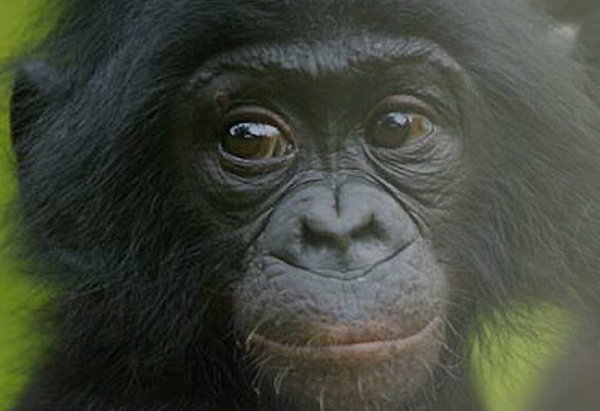
Looking towards our future… Photo: Vanessa Woods
Related Links
Bonobo Handshake by Vanessa Woods
Interview with Vanessa Woods on The Dr. Susan Block Show
Adopt a Bonobo at Lola ya Bonobo
The Bonobo Conservation Initiative
The Bonobo Way: Interview with Dr. Richard Wrangham on The Dr. Susan Block Show
Block Bonobo Foundation
Bonobo Bashing in the New Yorker
Bonobo Way Social Networking Community
The Bonobo Imperative: Interview with Bushmeat Project Director Dr. Tony Rose
Bonobo: The Forgotten Ape by Dr. Frans de Waal
Demonic Males: Apes and the Origins of Human Violence by Dr. Richard Wrangham
Primal Tears by Kelpie Wilson
LANA & ME: Meetings with Remarkable Apes
Make Like Bonobos, Not Baboons: Join The Speakeasy (Block Studios)! Call 310.568.0066 for info.
Liberate Your Inner Bonobo through Telephone Sex Therapy with The Dr. Susan Block Institute: Call 213.291.9497 anytime 24/7
Bonobo Handshake Photo Galley: All Photos in This Gallery Copyright Vanessa Woods
[AMAZONPRODUCTS asin=1592406343]
Explore DrSusanBlock.com
Need to talk? Sext? Webcam? Do it here. Have you watched the show? No? Feel the sex. Don’t miss the Forbidden Photographs—Hot Stuff, look at them closely here. Join our private social media Society. Join us live in studio 😊. Go shopping. Gift shop or The Market Place. DrSusanBlock.tv, real sex TV at your toe tips. Sex Clips Anyone? FASHION, we have fashion! We also have politics. Politics? Have you Read the book? No? How about the Speakeasy Journal? Click here. Ok, how about some free sex advice?






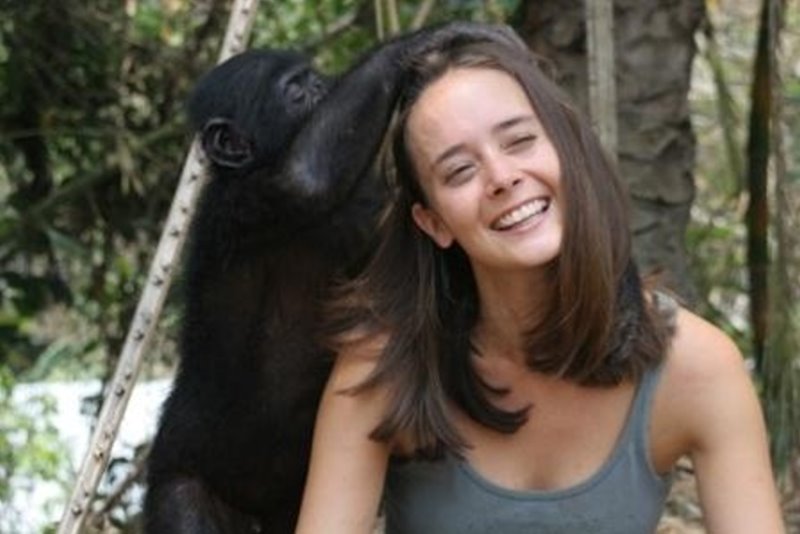



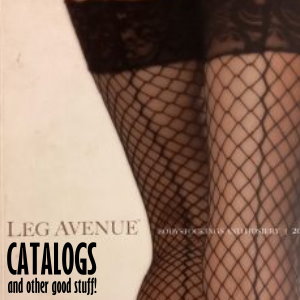


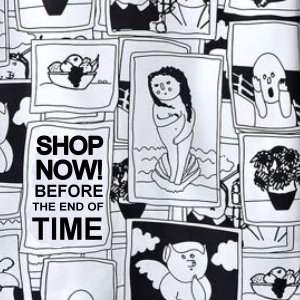

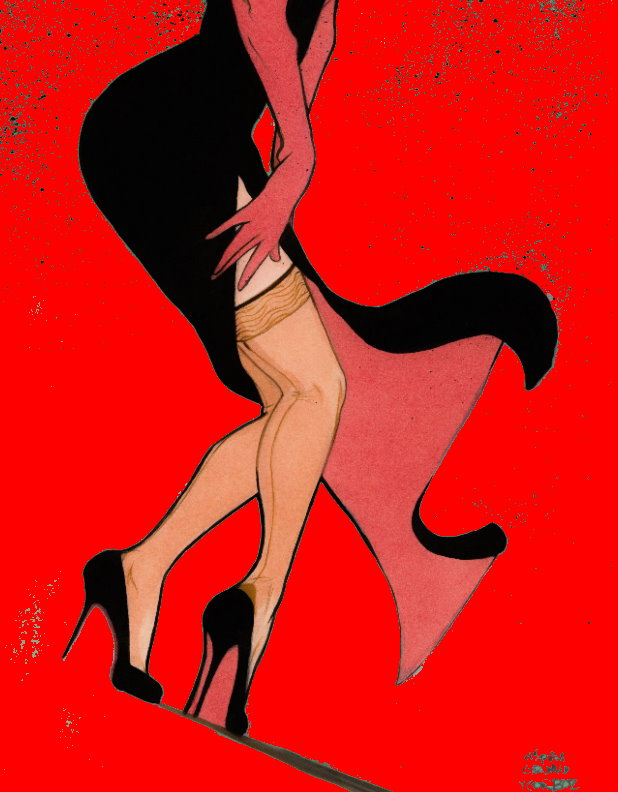
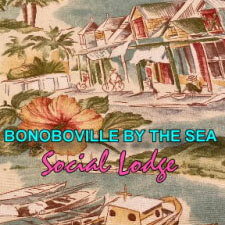



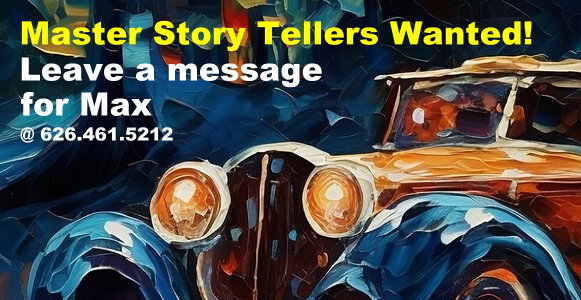
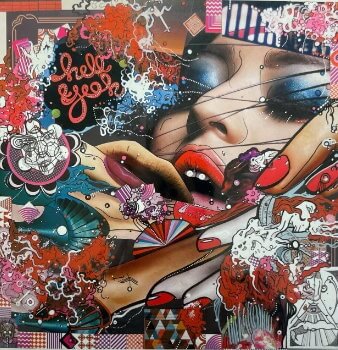


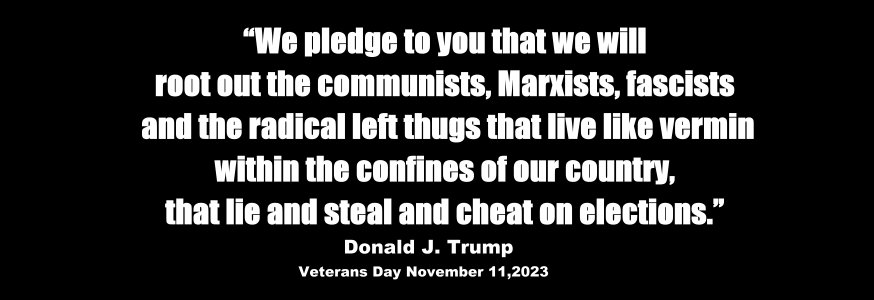

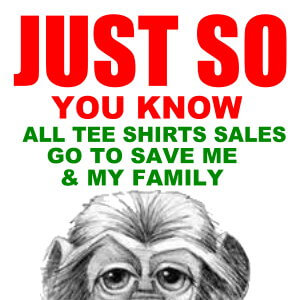





 Get The Bonobo Way
Get The Bonobo Way You Must Read
You Must Read  And Also,
And Also,
12 · 22 · 10 @ 11:02 am
There have been traditional human populations that were pretty sexually free with one another– but they had to be small, isolated populations. Once such a population becomes large enough to sustain an epidemic, frequent change of sexual partners becomes a very effective way to amplify the virulence of whatever diseases are circulating. (See Paul Ewald, _The Evolution of Infectious Disease_ , for the reasons why this is the likely outcome (for critters not equipped with modern precautionary techniques ).) So the bonobos have ways that suit their particular niche in the world; and we have rather less attractive traits that suited the way our ancestors were living. One excuse for our history, for example, is: “We were all drunk at the time.” (You couldn’t live in a good-sized ancient European city without mixing enough alcohol with your water to keep it from doing you in. The Chinese, having tea, made a little more sense now & then.) But mainly, large, greedy, violent organizations had an advantage over groups that wanted to live fun, sensible lives. (In the contemporary situation, where collective greed and violence can readily do in the lot of us, we can recognize that as a dead-end strategy… but God knows if we’ll manage to give it up!) Anyway, one could almost suffer from bonobo envy… but they don’t have as much fun with our second-favorite organ.
08 · 2 · 10 @ 12:20 am
You are sooooooooo right, Vanessa is a hottie. Wonderful topic, love how important the bonobos are to you.
07 · 29 · 10 @ 4:12 pm
Outside of the fact that we may learn from our Bonobo relatives, kudos to Dr. Block for her tireless championing of these creatures. I say this not from being a friend and follower for the last decade, but for the fact that she done more than most to make us aware of these wonderful primates.
Thanks Doc Block!
07 · 29 · 10 @ 1:45 pm
Very incredible show…I was very glad of the things discussed during the show. It wasn’t only focused on their sex lives, the bonobos, but also on the hardships that the monkeys go though where they come from…
07 · 24 · 10 @ 10:15 pm
Just finished the book “Heart of Dryness” by James Worthington. It dealt with Kalahari Bushmen; what was interesting was that ‘war’ as such was never mentioned, except in the last chapter, where Worthington stated that war was unknown to the Bushmen. These people have lived in near total isolation for maybe 100,000 years. If the Bonoboes are considered a species separate from Chimpanzees, maybe the Bushmen should be considered as separate from Homo sapien sapiens.
I’ve been informed of the Bonoboes since the early ’90s. It’s been a great reservoir of personal strength to me that ‘make love, not war’ is, in fact the correct outlook. It’s a sad sad reflection of the human species that it takes a lesser (sic) relative to prove that.
07 · 16 · 10 @ 8:11 pm
I loved this piece. Knowledge of Bonobo culture is spreading, even as the New Yorker and others suppress that knowledge and misinform. Pretty much all my good friends are up on it, despite all that. Your work spreading the word has had a great influence. We need to emulate our bonobo relatives more and fight for their habitat.
07 · 14 · 10 @ 7:17 pm
Beautiful article, Dr. Block. Thank you for your tireless–and entertaining–advocacy of the bonobos for so many years.
07 · 13 · 10 @ 10:16 pm
There have been traditional human populations that were pretty sexually free with one another– but they had to be small, isolated populations.
Once such a population becomes large enough to sustain an epidemic, frequent change of sexual partners becomes a very effective way to amplify the virulence of whatever diseases are circulating. (See Paul Ewald, _The Evolution of Infectious Disease_ , for the reasons why this is the likely outcome (for critters not equipped with modern precautionary techniques ).)
So the bonobos have ways that suit their particular niche in the world; and we have rather less attractive traits that suited the way our ancestors were living. One excuse for our history, for example, is: “We were all drunk at the time.” (You couldn’t live in a good-sized ancient European city without mixing enough alcohol with your water to keep it from doing you in. The Chinese, having tea, made a little more sense now & then.) But mainly, large, greedy, violent organizations had an advantage over groups that wanted to live fun, sensible lives. (In the contemporary situation, where collective greed and violence can readily do in the lot of us, we can recognize that as a dead-end strategy… but God knows if we’ll manage to give it up!)
Anyway, one could almost suffer from bonobo envy… but they don’t have as much fun with our second-favorite organ.
07 · 12 · 10 @ 7:01 pm
The show was great. Intellectually compelling, stimulating, and it gave me the opportunity to more closely develop a better sense of human nature and violence. We have a choice unlike most other animals, a conscious choice to be more like Bonobos or Baboons. I saw an article today where some “Dumb chimp” commented on the Psychology Today article that really got me going. My recommendation to you all is to not only talk about Bonobos to co-workers and friends, but to non-violently attack (via words) the forces in the media that would support researchers tailoring their findings to reflect a less sexual bonobo. Is that what we want in our scientific community? Censored data? Sorry but that really pisses me off to see something founded on the ideals of unbiased analysis twisted and corrupted. I hope it outrages you too. Read the article and comments on Psychologytoday.com
07 · 12 · 10 @ 6:01 pm
i just listened to your interview with Vanessa Woods, and you know, you guys are GREAT to listen to and great interviewers, i keep forgetting. I need to check out your tv/radio stuff more.
The discussion of the Bonobos (and in my uneducated opinion, but convincing observations) about animals in general having “higher” feelings than is commonly believed, and in fact my personal “opinion” is that ALL living creatures have at least some level of what we call emotions. The witnessing of the Bonobos begging for their life brought me to tears, just as Max (I think it was he who) said. I also simply loved listening to you and your “glass” protected interaction with the Bonobos.
I could tell you many examples, but one was a frog that I actually got a picture of… Maybe it was just curiosity but I talked, slow and calmly and sat without moving (Ironically something my dad taught me) for around 15-20 minutes and he slowly got closer, clearly interested for some reason. In a film type 35mm SLR (single lens reflex) the mirror is very loud and the frog immediately went under the water as soon as I pushed the shutter. Its the mirror in the camera that lifts out of the way so the light can hit the film that makes the noise.
I had an interesting encounter with a rather large black snake a few weeks ago and a very large (4-5ft) timber rattler not long after I moved here, in my front yard. I approached both of them very slowly and at a safe and non-threatening distance and talked calmly the entire time. Both were interesting, and interested or maybe curious or maybe only assessing the situation though the rattle snake took me a few minutes to get over the initial fear that came naturally.
…and just now I’m listening to your conversation with the caller “spencer” and his being in a wheel chair as a reason for not having relationships with women, and Max’s example of Frank Moore was inspirational.
Great show!
07 · 12 · 10 @ 4:23 pm
Once again, you show true compassion for these amazing creatures. We can definitely learn from them in many ways.
07 · 12 · 10 @ 4:19 pm
humans are more closely related…socially, culturally, militarily, sexually, and emotionally/psycologically to….baboons, hah, not an ape at all, but just as linear, shallow, aggressive, greedy, and self-destructive…..think upon it.
07 · 12 · 10 @ 3:50 pm
I wish you would have mentioned Frans de Waal’s other great book, Our Inner Ape, exploring the triad of us, chimps, and bonobos.
07 · 12 · 10 @ 3:56 pm
Yes Gehmans, Frans de Waal’s Our Inner Ape: A Leading Primatologist Explains Why We Are Who We Are is an excellent book, but its not ALL about bonobos. In fact, it doesn’t even include the word “bonobos” in the title. Thus I didn’t reference it when talking about Bonobo Handshake being the only book focused on bonobos published by a major house, besides Bonobo: The Forgotten Ape.
07 · 12 · 10 @ 2:51 pm
“. . . bonobo orphans appear to be more fragile and sometimes, despite the best of care, simply fail to rally. Perhaps this is a painful corollary to being peaceful, sexual, empathetic and sensitive: difficulty coping with the barbarity of war and the cold-blooded murder of loved ones.”
I think this has a lot to say about the human species, who survives and who doesn’t. Human civilization has never rewarded the sensitive and the empathetic, but it’s got lots of supposed goodies for the cruel and barbaric. I look at civilization and wonder why all humans aren’t alcoholic, depressed, insane, . . .
Susan Elizabeth Siens
Unity, Maine
07 · 12 · 10 @ 2:07 pm
Many thanks for your support in spreading the Bonobo word which you have excelled at. Appreciate your new BLOG, as it provides additional information on Vanessa Woods and her new book Bonobo Handshake which I am looking forward to reading. Vanessa is a striking woman. Good to have her on our side.
Since the BONOBO is threatened with Extinction we have little time to convey the importance of this Primate species.
Susan, Your Peace Through Pleasure slogan needs Global distribution.
Toward The Future and Peace through Pleasure
Again, many thanks
Jim
07 · 12 · 10 @ 12:57 pm
Great piece–as usual. Keep up the great work.
John V. Walsh, MD
Professor of Physiology
University of Massachusetts Medical School
p.s. And I plan to buy the book.
07 · 11 · 10 @ 3:15 pm
When the New Yorker attacks the bonobos, you know humanity has a sex problem.
07 · 11 · 10 @ 3:04 pm
What is with all these warmongering journalists making monkeys of a gullible bloodthirsty public?
07 · 11 · 10 @ 2:53 pm
I don’t know about these apes, but Vanessa Woods is a total babe.
07 · 11 · 10 @ 2:45 pm
shari babeeee u never came over to my place to give me that blowjob you promised a few blogs ago. cum on honey i got plenty bananas for u
07 · 10 · 10 @ 3:48 pm
I had a great time at the taping of your show last Sat night when you had Vanessa on the phone. It was fascinating watching her interaction with the cuddly & playful bonobos on your tv monitors. What’s really beautiful is the love they share between one another. Wouldn’t this world be less stressful if we did nice things for each other? And, don’t you feel like you know someone better once you become intimate? And, then once you’re intimate it’s so easy to care for people in a meaningful way. The joy on a man’s face, the bliss exuded once treated to deliciously oral pleasures is one of contentment, camaraderie, and genuine openness to reach out to others once the edge is removed and replaced by ecstasy.
Love your work and that you’re so dedicated to spreading pleasure of all kinds. Besos.
07 · 10 · 10 @ 3:46 pm
Casey…omg…you’re too funny
07 · 10 · 10 @ 1:48 am
So everybody is crying…such big babies, me too, the tears were just rolling down my cheeks. That hand clapping when in the gun sight of a hunter just got to me. They are such delicate creatures. Thanks for a great show and viva Vanessa, I’d like her for a mommy and thanks for making me cry, I haven’t done soo since Vietnam.
07 · 9 · 10 @ 9:44 pm
OK,OK, you’ve turned me into a Bonobo, I’m gonna buy the book. Heard the interview with Ms Woods, she was great, there were times I was crying and I’m as big as a gorilla, I’m not moved easily but these creatures are truly amazing. I will lend my help to protect these guys. Is it possible to go visit them in the Congo? Perhaps we could organize a group trip? Is that OK you think?
Anyway then I noticed the pictures from the show, you all look like human Bonobos. Those are some mighty hot creatures you got running around the studio. I will have to join you one night.
You can call me anytime and let’s talk about this. My number is 213.364.xxxx.
Best Regards Doc…
Charles
07 · 9 · 10 @ 9:30 pm
wow those are some sexual critters. if the females didn’t have so much hair and the big ears, um… well… maybe not. but they are cool. yeaa bonobos rock!
07 · 9 · 10 @ 9:00 pm
I have tears in my eyes. I knew from your previous writings and shows that bonobos have a lot of sex and no war, which is awesome enough, but hearing about how they care for each other and are so close to human in so many ways. It’s just mind-boggling. They are so close and yet so far away. I am going to adopt a bonobo too, Dr. Suzy, just gotta set up a paypal account, but I will adopt a bonobo this week for sure. Thank you for opening my eyes, even if it made the tears spill out of them.